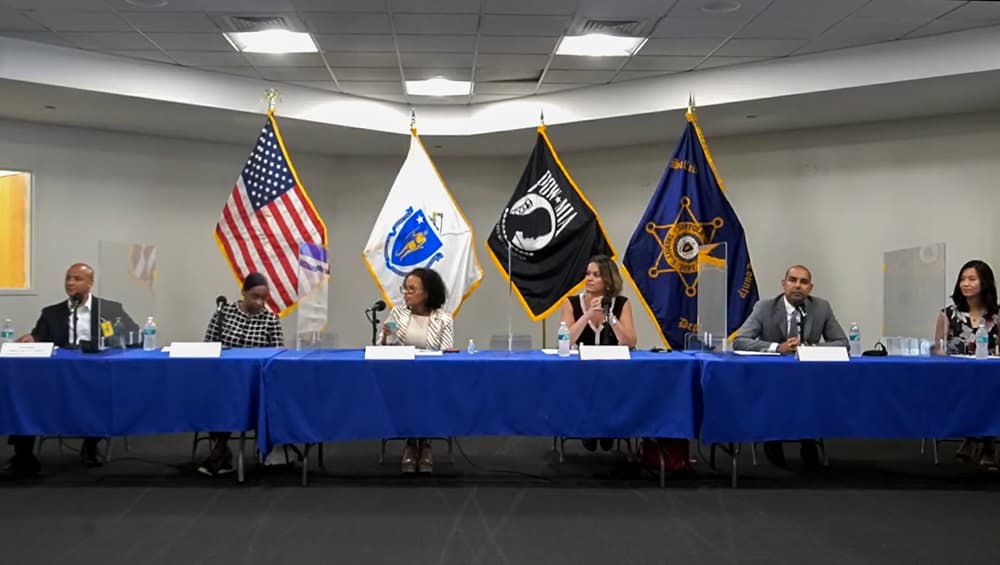Advertisement
Boston's Historic Race For Mayor Matters To The Entire Region. Why Aren't More People Paying Attention?

As the city of Boston faces a historic race for mayor, there's evidence that lots of people aren't paying attention — or just don't care.
WBUR's April poll on the mayor's race found almost half of those surveyed were undecided about who to support, and that a majority didn't know the names of all the major candidates. But three-and-a-half months before the primary, some people are paying attention to the election.
"It's very important," said Chris Francois, 32, who lives in Dorchester and works for the state Department of Transportation.
There are six major candidates — all of them people of color — so next November, voters will elect the first mayor in the city's 200 year history who will not be a white man.
"I think that would be a good message to send out to the residents of color," Francois said. "[It will say], 'you, too, can be the mayor of Boston one day, regardless of your skin color.' "
Francois said he's supporting acting Mayor Kim Janey, and wants her to focus on jobs — particularly in Dorchester, Roxbury and Mattapan, where he said too many people need them. The five other major candidates include city councilors Michelle Wu, Andrea Campbell and Anissa Essaibi George; State Rep. Jon Santiago; and Boston's former chief of economic development, John Barros.
But if Francois is dialed into the race for mayor, many people in his neighborhood are not.
"You're dealing with a lot more crime and poverty," he said. "A lot of people are hopeless where I live. I don't really see them talking about this mayor's race. I don't really hear excitement. They don't really think things will change."
That lack of interest in the race was evident on a recent afternoon in Nubian Square in Roxbury, where Lee, who who didn't want to provide his last name for fear of violating his employer's rules, said he is not following the contest. The main reason is because he lives in Lynn — and said what happens in Boston doesn't affect him.
Advertisement
"It really doesn't because...the mayor [works] for [Boston]," Lee said. "[She] doesn't work for outside-the-city-people."
But the mayor of Boston has a huge impact on surrounding communities, according to Mark Draisen, Executive Director of the Metropolitan Area Planning Council, which promotes collaboration among 101 cities and towns around greater Boston.
"We are interdependent," he said. "We have a single economy. We have a single transit system. And the mayor of Boston has an outsized influence on all of these things."
Draisen said Boston's mayor can promote policies that affect the entire region. Housing is a good example: Boston is at the epicenter of a regional housing shortage, so, Dreisen said, if the city can address its housing needs the benefits will ripple deep into the surrounding region.
"The mayor of Boston has a real ability to get mayors and managers and legislators together to discuss common problems and figure out a common solution," Dreisen said. "When the mayor of Boston speaks, other people listen. They take it very seriously."
Draisen said the mayor of Boston can exert regional leadership on other pressing issues, including climate change, education and racial equity. Katherine Levine Einstein, a professor of political science at Boston University's Initiative on Cities, agreed. As Boston prepares to elect its first mayor of color, it can lead the region with its power of example and political pressure, she said.
"One of the really interesting trends that we're seeing in a lot of very lily-white suburbs of Boston is the emergence of groups [such as] 'Belmont [Against] Racism' or 'Arlington Fights Racism,' " Einstein said. "Boston in many ways is positioned to be a leader in that space."
But it's not a given that Boston's next mayor will be the right mayor to lead in this post-George Floyd moment, with concurrent challenges of a pandemic and widespread economic distress and inequality, according to Michael Curry, past President of the Boston NAACP, who heads the Massachusetts League of Community Health Centers.
Curry said all six mayoral candidates bring a lot to the table — but he offers a caution.
"Not every candidate is a great candidate for the moment, and that's where you can mess up," Curry said.
Interest in the mayoral race is low right now, according to Curry, because of what the country has been through: four years of an exhausting and controversial presidency, a pandemic, a bitter election and a riot at the U.S. Capitol, all of which caused many people to tune out of politics. But Curry is hopeful that as summer approaches, voters in the region will tune back in, given what's at stake.
"We need to make sure that people are plugged in enough, paying attention to every single candidate and their platform and their vision, so that we get the right mayor for the moment we are in," he said.
Curry called it a "huge moment" not just for Boston — but also for cities and towns across the region.
This segment aired on June 4, 2021.
